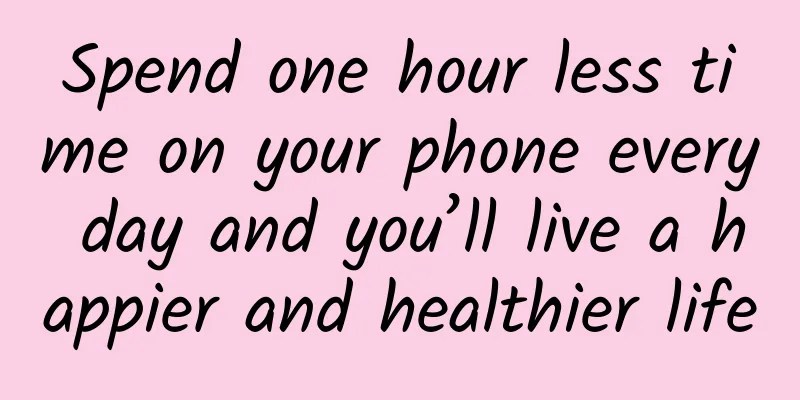Spend one hour less time on your phone every day and you’ll live a happier and healthier life

|
Over the past decade or so, smartphones have become an indispensable tool in our daily lives. When I wake up in the morning, I check my Moments for a while; on the way to work, I check Weibo for a while; when I go to the bathroom at the company, I check Douyin for a while; when I eat lunch, I watch TV series for a while; when I feel sleepy in the afternoon, I chat about gossip for a while; when I get home in the evening, I play games for a while; before going to bed, I check my Moments for a while again. It feels like it’s not us playing with our phones, but our phones playing us. From neck pain to addictive behavior, some of the negative consequences of excessive smartphone use are already evident. So, has the emergence of smartphones really made our lives better? Or, is our life really better without smartphones? In order to explore this issue scientifically and rigorously, psychologists from the Center for Mental Health Research and Treatment at Ruhr-Universität Bochum (RUB) in Germany conducted an experimental intervention study. The relevant research results were published in the recent Journal of Experimental Psychology. Specifically, the researchers recruited 619 people to participate in the experiment and randomly divided them into three groups: 200 of them completely gave up their smartphones for a week; 226 people reduced their smartphone usage time by one hour per day; and 193 people maintained their original smartphone usage habits without making any changes. The researchers interviewed all participants one month and four months after the intervention to learn about their lifestyle habits and well-being. Specific questions included: Are they now participating in more physical activity? How many cigarettes do they smoke each day now? How satisfied are they with their current lives? Do they show any signs of anxiety or depression? By comparing the effects of completely quitting smartphones, reducing daily screen time, and changes in the lives of participants who continued to use smartphones, the researchers found that reducing daily smartphone use can have a positive impact on a person's well-being. Reducing smartphone use by just one hour per day was associated with reduced anxiety and higher life satisfaction, as well as increased life satisfaction and time spent physically active, and decreased symptoms of depression and anxiety, as well as nicotine consumption. And the findings also found that it is not necessary to give up smartphone use completely in order to have a better, more satisfying life, and less anxiety. In the long run, the one-week intervention changed the participants' usage habits. Even four months after the end of the experiment, the group members who completely quit smartphones used smartphones for an average of 38 minutes less per day than before; and the group members who reduced their smartphone use time by 1 hour per day during the experiment used smartphones 45 minutes less per day after four months. "It's not necessary to give up your smartphone completely, just find an optimal daily usage schedule," concluded study author Julia Brailovskaia, PhD, of the Center for Mental Health Research and Treatment at Ruhr-University Bochum in Germany. "We found that giving up smartphones completely or reducing their use by one hour per day had positive effects on participants' lifestyle and well-being," says Julia Brailovskaia. "In the group that reduced use, these effects lasted even longer and were therefore more stable than in the group that gave up completely." On average, modern people spend more than three hours a day staring at a smartphone screen. We use our phones to look up information, check maps, check emails or the weather, shop, read the news, watch movies, and chat on social media. In fact, using mobile phones before going to bed or even after turning off the lights and lying down is a common habit for many young people. However, this unhealthy habit may lead to late bedtime, less sleep, poor sleep, and increased daytime fatigue. Sleep plays an important role in emotional and cognitive functions, and insufficient sleep, restricted sleep, and sleep disorders may have a negative impact on emotional and cognitive functions. With more and more mobile use, suspicion of its negative effects seems reasonable. Previous studies have also shown that smartphone use is associated with reduced physical activity, obesity, neck pain, impaired performance, and addiction-like behaviors. As Julia Brailovskaia said, "Smartphones are both a blessing and a curse." The latest research shows that making conscious and controllable changes to the time spent on smartphones every day can promote subjective well-being (reduced depression and anxiety symptoms, reduced tendency to use problems, and increased life satisfaction) and a healthier lifestyle (more physical activity, less smoking behavior). So in the long run, reducing smartphone use by just one hour a day could have a positive impact, but there's no need to completely give up your phone. References: https://doi.apa.org/doiLanding?doi=10.1037%2Fxap0000430 https://news.rub.de/english/2022-04-20-psychology-fewer-smartphones-more-well-being Academic headlines |
<<: A woman drank 8 glasses of water a day and developed blindness? 6 truths about drinking water
Recommend
Teach you how to open the Douyin "product showcase" step by step
There are three ways to monetize Douyin: product ...
The most comprehensive inventory! This year's most practical World Cup marketing and viewing guide!
After reading so much World Cup marketing informa...
Toutiao’s information flow ads do not support oCPC. What is the motivation behind this?
I wrote an article about Toutiao before, which wa...
Sinochem International and Bojun Automotive signed an investment cooperation agreement
Recently, the signing ceremony of the investment ...
The fresher the food, the better? These foods are not good if they are too fresh!
This issue is planned: 91, Little Dandelion This ...
Opening an app 60 times a day may lead to addiction
According to the data analysis of 1.3 billion mobi...
2 million daily active users, 20% click-through rate, how to place subway Wi-Fi ads!
"Peanut Wi-Fi, Limei Wi-Fi, KFC - early enco...
Baidu World Conference releases new products and AI technology ranks among the world's top
The 2017 Baidu World Conference was held in Beiji...
Let robots learn "common sense" by themselves? They can correct themselves and complete complex household chores without humans!
Robots are excellent human imitators, but most of...
The neglected performance of mobile phone flash memory is actually more important than the processor
In recent days, two unfamiliar words suddenly ent...
How to maintain seed users and enable them to optimize and spread products?
Maintaining seed users is actually a matter of co...
Online production of Ukrainian beauties holding signs and shouting videos, online orders, sincerely recruiting agents!
The beauty sign-holding team includes the Russian...
Do you understand the “blood” of the earth?
Do you understand the “blood” of the earth? Quest...
IFR: Understand the current status and trends of global industrial and service robots in one article
The International Federation of Robotics (IFR) re...
Why is the fifth day of the first lunar month called "Po Wu"? How to "Po"?
This article was reviewed by Shao Lin, a popular ...









